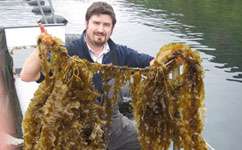Algae cultivation could boost UK industry

UK companies could cash in on the massive opportunities available from producing biofuels and other products from cultivated algae, say scientists.
There is an increasing appetite from the government, businesses and the public for green energy technologies but there are currently very few UK companies with the expertise and capacity to cultivate algae for commercial uses.
Algae can be used in a huge variety of products – as a biofuel, in wastewater treatments, cosmetics, fertilizers and animal feeds, to name but a few.
Now a new report from the Algal Bioenergy Special Interest Group (AB-SIG) highlights the benefits of cultivating both macroalgae (seaweed) and microalgae (microscopic floating plants known as phytoplankton) for commercial use.
The report says that one of the benefits of using algae for wastewater treatment, for example, is that algal treatment processes are more likely to have low maintenance needs and can operate at room temperature. This will reduce the amount of energy used to heat or cool the system and should therefore save money.
Set up to rapidly scope the environmental science potential, build knowledge networks and develop research partnerships, the AB-SIG suggests that the potential for an energy and bulk chemicals market in the UK will be a long-term project requiring a significant amount of research and development.
Dr. Michele Stanley from the Scottish Association for Marine Science and Director of the AB-SIG, says "Cultivating algae for biofuels will provide an alternative to using land-grown crops, reducing both the threat of increased food costs and the effects on biodiversity, whilst benefiting energy producers, and the transport and aviation industries."
Market opportunities already exist for algal products, particularly to develop biofuels and bioenergy products, and chemicals such as those used in fertilizers and cosmetic products such as skin creams, sun lotions and soaps. The UK is in a good position to expand its current use and development of high-value algal products such as these.
Little is known about how the Earth's ecosystems will be affected by large-scale production of algae so the report also identifies some of the research that should be done to understand and manage potential impacts.
"This is an area which has considerable growth potential for the UK," says Stanley, "but it's also important to understand how an increase in algae cultivation will affect both land and water environments and the plants and creatures that currently thrive in them."
The report 'Research needs in ecosystem services to support algal biofuels, bioenergy and commodity chemicals production in the UK' was prepared for the AB-SIG by the National Non-Food Crops Centre.
The AB-SIG is a two-year initiative funded by the Natural Environment Research Council and the Technology Strategy Board and supported by the Living With Environmental Change partnership. It is coordinated by the Biosciences Knowledge Transfer Network which aims to turn bioscience into business, helping UK industry profit and grow.
More information: The report 'Research needs in ecosystem services to support algal biofuels, bioenergy and commodity chemicals production in the UK' was prepared for the AB-SIG by the National Non-Food Crops Centre.
Provided by PlanetEarth Online
This story is republished courtesy of Planet Earth online, a free, companion website to the award-winning magazine Planet Earth published and funded by the Natural Environment Research Council (NERC).

















